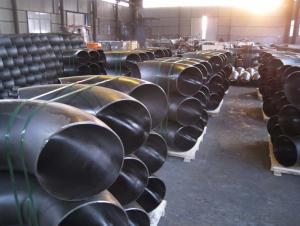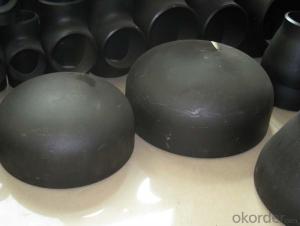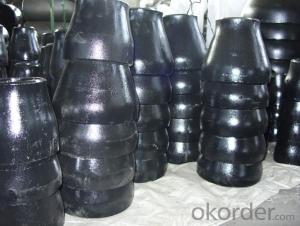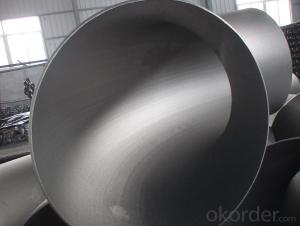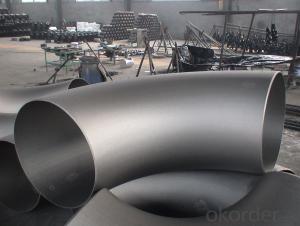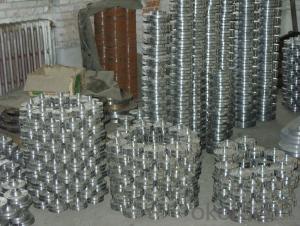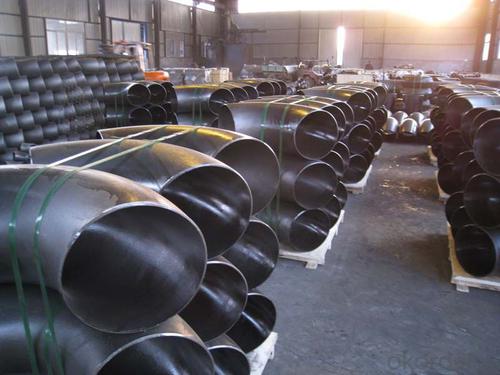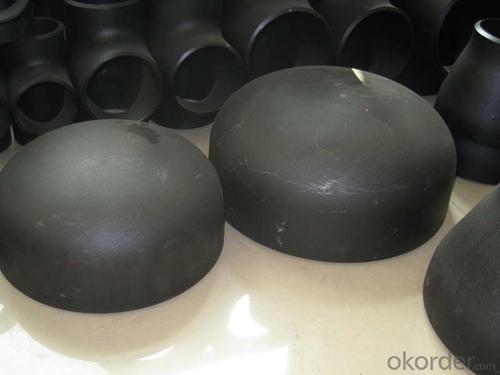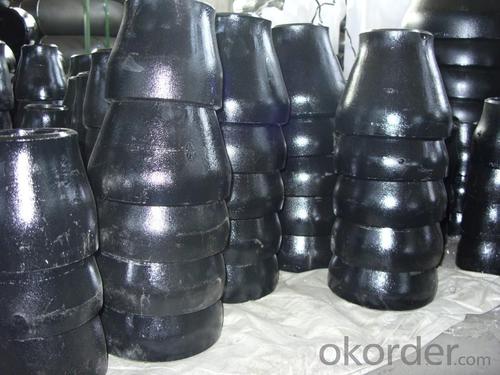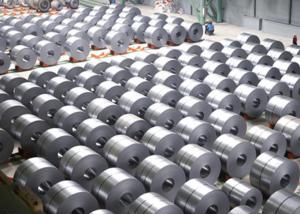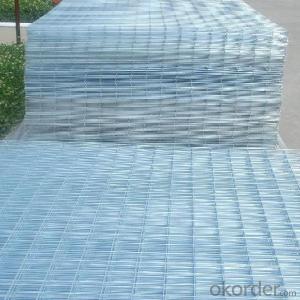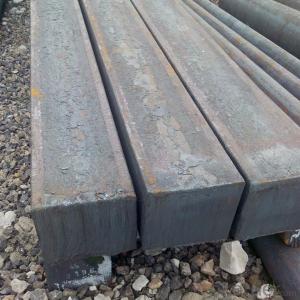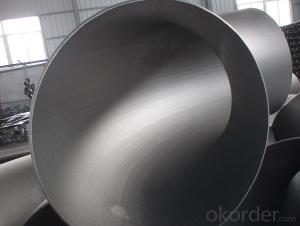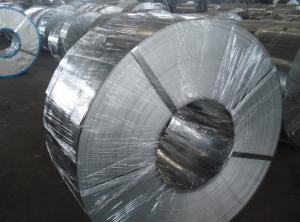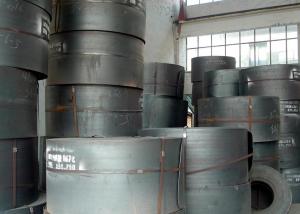Carbon Steel Pipe Fittings SA105 BEND
- Loading Port:
- China Main Port
- Payment Terms:
- TT OR LC
- Min Order Qty:
- -
- Supply Capability:
- -
OKorder Service Pledge
OKorder Financial Service
You Might Also Like
Specifications
pipe fitting elbow
Certificate:ISO:9001-2000
New material,completely meet asme and din standard
Best price
1. type: AISI ASTM A234 WPB BW Con Elbow
2. Size: 1/2"-48"(1/2"-24"is seamless and 26"-48"is welded)
3. Wall thickness: sch10-160, STD, XS, XXS
4. Material: A234WPB, A420WPL6, A420WP5, WP11, WP12, WP22, etc
5. Welding line: seamless
6. Angle of bend: 30, 45, 90, 180degree
7. Bending radius: SR, LR
8. Standard: ANSI B16.9, JIS, SB, DIN, GB
9. Surface treatment: black paint, vanis paint, black rust-proof oil,
transparent oil, hot galvanizing
10. Application: petroleum, electricity, chemical, natural gas, metallurgy,construction,
shipbuilding and other fields because of its high pressure, high temperature, etc
11. connection: welding
12. technics:forged
13.Certificate:ISO9001 - 2000, CE, SGS, etc.
14. packaging: wooden case, pallet, container or in accordance with the
requirement of customers
15. Principle: quality fist, customer first, credit first
16. payment: L/C T/T
17. delivery time: 7-25 days after payments
18. Notes: the bevel can be made in accordance with the special requirements
of the customers
19. Others: we can also produce the products according to the requirements
of the customers
The main production:
1. PIPE FITTINGS: elbows, tees, bends, reducers, cap, flanges and sockets etc.
2. PIPE: bult welded pipes, seamless pipes, threaded pipes, etc.
We sincerely welcom customers at home and abroad to visit us and seek common development.
- Q: What are the different types of steel tubes and their uses?
- There are several different types of steel tubes, each with their own unique characteristics and uses. Some common types include seamless tubes, which are often used in high-pressure applications such as oil and gas pipelines, automotive components, and machinery parts. Welded tubes, on the other hand, are created by welding or bending a flat steel strip into a tubular shape and are commonly used in construction, furniture manufacturing, and transportation industries. Additionally, galvanized tubes are coated with a protective layer of zinc to prevent corrosion and are commonly used in outdoor structures and plumbing systems. Lastly, stainless steel tubes are highly resistant to corrosion and are used in a wide range of applications, including medical equipment, food processing, and chemical industries.
- Q: How is steel used in the production of pipelines?
- Steel is commonly used in the production of pipelines due to its strength, durability, and corrosion resistance. It is used to manufacture the pipe itself, providing a reliable and long-lasting material for transporting fluids and gases over long distances. Steel pipes are also commonly coated or lined to further enhance their resistance to corrosion and improve their overall performance in various environments.
- Q: How are steel gratings used in the construction of staircases and platforms?
- Steel gratings are commonly used in the construction of staircases and platforms to provide a sturdy and safe walking surface. These gratings are typically installed as treads or platforms, allowing for efficient drainage and ventilation while ensuring stability and strength. The open design of the gratings also offers enhanced visibility, making them a popular choice in industrial and commercial settings where safety is paramount.
- Q: How do steel products contribute to the manufacturing and industrial sector?
- Steel products are essential in the manufacturing and industrial sector due to their strength, durability, and versatility. They are used in the construction of infrastructure such as buildings, bridges, and roads, providing a solid foundation for economic development. Moreover, steel products are crucial components in machinery, equipment, and vehicles, ensuring their reliability and enhancing productivity. Additionally, steel's recyclability allows for sustainable manufacturing practices, reducing environmental impact. Overall, steel products play a vital role in driving growth, innovation, and progress in the manufacturing and industrial sector.
- Q: What are the properties of heat-resistant steel for high-temperature applications?
- Heat-resistant steel for high-temperature applications possesses several key properties. Firstly, it has a high melting point, allowing it to withstand extreme temperatures without deformation or failure. Additionally, it exhibits excellent thermal stability, maintaining its mechanical strength and structural integrity even at elevated temperatures. Heat-resistant steel also possesses good oxidation resistance, preventing the formation of scale or oxide layers when exposed to oxygen-rich environments. Furthermore, it has low thermal expansion, reducing the risk of thermal stress and cracking. Lastly, heat-resistant steel often has good creep resistance, enabling it to withstand prolonged exposure to high temperatures without significant deformation or failure.
- Q: How is steel used in the construction of hospitals and healthcare facilities?
- Steel is used in the construction of hospitals and healthcare facilities for various purposes such as structural support, framing, and reinforcement. It provides strength, durability, and resistance to fire and earthquakes, ensuring the safety and stability of the buildings. Steel is also used in the construction of medical equipment, fixtures, and furniture, making it an essential material in the healthcare industry.
- Q: What are the applications of steel mesh in security fencing?
- Steel mesh is commonly used in security fencing due to its high strength and durability. It provides a robust barrier that is difficult to breach, making it ideal for securing residential, commercial, and industrial properties. The small openings in the mesh allow for visibility and airflow, while still preventing unauthorized access. Additionally, steel mesh can be easily customized to fit different spaces and can be combined with other security measures such as barbed wire or electronic systems for enhanced protection.
- Q: How does steel sheet metal welding and joining work?
- Steel sheet metal welding and joining is a process that involves melting and fusing two or more pieces of steel sheet metal together to create a strong bond. This is typically achieved by applying heat to the metal surfaces to be joined, either through the use of a flame or an electric arc. The molten metal is then allowed to cool and solidify, creating a solid and durable joint. Various methods such as gas welding, arc welding, laser welding, or spot welding can be employed depending on the specific requirements of the project. Additionally, filler materials may be used to strengthen the joint and ensure proper fusion.
- Q: What are the different types of steel pipes and their uses?
- There are several types of steel pipes, including carbon steel pipes, stainless steel pipes, alloy steel pipes, and galvanized steel pipes. Carbon steel pipes are commonly used in industries such as oil and gas, construction, and plumbing due to their strength and affordability. Stainless steel pipes are corrosion-resistant and widely used in industries like food processing, pharmaceuticals, and chemical engineering. Alloy steel pipes are designed to withstand high temperatures and pressures, making them suitable for applications in power plants and refineries. Galvanized steel pipes are coated with a layer of zinc to prevent rusting, making them ideal for outdoor and plumbing applications.
- Q: What are the different types of steel sheets and their uses in the automotive industry?
- There are several types of steel sheets used in the automotive industry, including hot-rolled, cold-rolled, galvanized, and advanced high-strength steels. Hot-rolled steel sheets are commonly used for structural components, while cold-rolled steel sheets are used for body panels and other aesthetic parts. Galvanized steel sheets provide corrosion resistance and are often used for underbody components. Advanced high-strength steels have superior strength-to-weight ratios and are utilized in safety components like door beams and crash structures. Overall, these different types of steel sheets serve various purposes in the automotive industry, from structural support to safety enhancement.
Send your message to us
Carbon Steel Pipe Fittings SA105 BEND
- Loading Port:
- China Main Port
- Payment Terms:
- TT OR LC
- Min Order Qty:
- -
- Supply Capability:
- -
OKorder Service Pledge
OKorder Financial Service
Similar products
Hot products
Hot Searches
Related keywords
